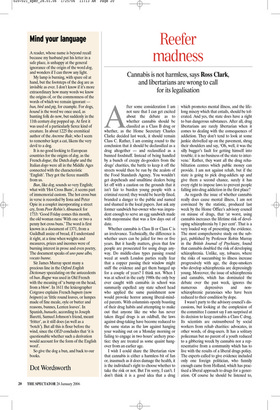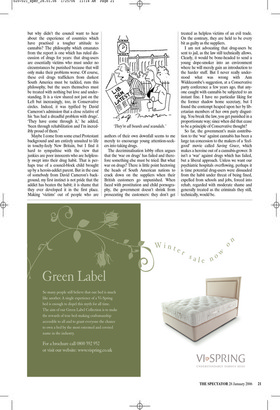Reefer madness
Cannabis is not harmless, says Ross Clark, and libertarians are wrong to call for its legalisation After some consideration I am not sure that I can get excited about the debate as to whether cannabis should be classifed as a Class B drug or whether, as the Home Secretary Charles Clarke decided last week, it should remain Class C. Rather, I am coming round to the conclusion that it should be declassified as a drug altogether — and reclassified as a banned foodstuff. Instead of being handled by a bunch of creepy do-gooders from the drugs’ charities, the battle to keep it off the streets would then be run by the zealots of the Food Standards Agency. You wouldn’t get dopeheads and smalltime dealers being let off with a caution on the grounds that it isn’t fair to burden young people with a criminal record; they would be heavily fined, branded a danger to the public and named and shamed in the local papers. Just ask any former sandwich bar-owner who was imprudent enough to serve an egg sandwich made with mayonnaise that was a few days out of date.
Whether cannabis is Class B or Class C is an irrelevance. Technically, the difference is whether users can be jailed for two or five years. But it hardly matters, given that few people are prosecuted for using drugs anyway. Do middle-class types passing round weed at south London parties really fear that a copper passing their window might sniff the evidence and get them banged up for a couple of years? I think not. When I was at school in the early 1980s the only boy ever caught with cannabis in school was summarily expelled: any state school head who applied the same punishment now would provoke horror among liberal-minded parents. With columnists openly boasting of their drug habits and attempting to make out that anyone like me who has never taken illegal drugs is an oddball, the laws against drug-taking have become reduced to the same status as the law against hanging your washing out on a Monday morning or failing to engage in two hours’ archery practice: they are treated as some quaint hangover from an earlier age.
I wish I could share the libertarian view that cannabis is either a harmless bit of fun or, inasmuch as it does damage the health, it is the individual’s right to choose whether to take the risk or not. But I’m sorry, I can’t. I don’t think it is a good idea that a drug which promotes mental illness, and the lifelong misery which that entails, should be tolerated. And yes, the state does have a right to ban dangerous substances. After all, drug libertarians are rarely libertarian when it comes to dealing with the consequences of addiction. They don’t tend to look at some junkie shrivelled up on the pavement, shrug their shoulders and say, ‘Oh, well, it was the silly bugger’s fault for getting himself into trouble; it is no business of the state to intervene.’ Rather, they want all the drug rehabilitation centres which public money can provide. I am not against rehab, but if the state is going to pick drug-addicts up and give them a second chance, surely it has every right to impose laws to prevent people falling into drug addiction in the first place?
As regards the issue of whether cannabis really does cause mental illness, I am not convinced by the statistic, produced last week by the Home Office’s advisory council on misuse of drugs, that ‘at worst, using cannabis increases the lifetime risk of developing schizophrenia by 1 per cent’. That is a very loaded way of presenting the evidence. The most comprehensive study on the subject, published by Professor Robin Murray in the British Journal of Psychiatry, found that cannabis doubled the risk of developing schizophrenia. Unlike, say, tobacco, where the risks of succumbing to illness increase progressively with age, the dope-smokers who develop schizophrenia are depressingly young. Moreover, the issue of schizophrenia and cannabis, which has dominated the debate over the past week, ignores the numerous depressives and nonschizophrenic paranoiacs who have been reduced to their condition by dope.
I wasn’t party to the advisory council’s discussions, but looking at the complexion of the committee I cannot say I am surprised at its decision to keep cannabis a Class C drug. Its scientists are outnumbered by social workers from rehab charities: advocates, in other words, of drug-users. It has a solitary policeman but no parent of a youth reduced to a gibbering wreck by cannabis nor a representative from a community which has to live with the results of a liberal drugs policy. The experts called to give evidence included only one foreign politician, who funnily enough came from Holland, which has practised a liberal approach to drugs for a generation. Of course he should be listened to, but why didn’t the council want to hear about the experience of countries which have practised a tougher attitude to cannabis? The philosophy which emanates from the report is one which has ruled discussion of drugs for years: that drug-users are essentially victims who must under no circumstances be punished because that will only make their problems worse. Of course, these evil drugs traffickers from darkest South America must be tackled, runs this philosophy, but the users themselves must be treated with nothing but love and understanding. It is a view shared not just on the Left but increasingly, too, in Conservative circles. Indeed, it was typified by David Cameron’s admission that a close relative of his ‘has had a dreadful problem with drugs’. ‘They have come through it,’ he added, ‘been through rehabilitation and I’m incredibly proud of them.’ Maybe I come from some cruel Protestant background and am entirely unsuited to life in touchy-feely New Britain, but I find it hard to sympathise with the view that junkies are poor innocents who are helplessly swept into their drug habit. That is perhaps true of a council-block child brought up by a heroin-addict parent. But in the case of somebody from David Cameron’s background, my first instinct is not pride that the addict has beaten the habit; it is shame that they ever developed it in the first place. Making ‘victims’ out of people who are authors of their own downfall seems to me merely to encourage young attention-seekers into taking drugs.
The decriminalisation lobby often argues that the ‘war on drugs’ has failed and therefore something else must be tried. But what war on drugs? There is little point hectoring the heads of South American nations to crack down on the suppliers when their British customers go unpunished. When faced with prostitution and child pornography, the government doesn’t shrink from prosecuting the customers: they don’t get treated as helpless victims of an evil trade. On the contrary, they are held to be every bit as guilty as the suppliers.
I am not advocating that drug-users be sent to jail, as the law still technically allows. Clearly, it would be bone-headed to send a young dope-smoker into an environment where he will merely gain an introduction to the harder stuff. But I never really understood what was wrong with Ann Widdecombe’s suggestion, at a Conservative party conference a few years ago, that anyone caught with cannabis be subjected to an instant fine. I have no particular liking for the former shadow home secretary, but I found the contempt heaped upon her by libertarian members of her own party disgusting. You break the law, you get punished in a proportionate way; since when did that cease to be a principle of Conservative thought?
So far, the government’s main contribution to the ‘war’ against cannabis has been a large tax concession to the makers of a ‘feelgood’ movie called Saving Grace, which makes a heroine out of a cannabis-grower. It isn’t a ‘war’ against drugs which has failed, but a liberal approach. Unless we want our psychiatric hospitals overflowing, perhaps it is time potential drug-users were dissuaded from the habit under threat of being fined, expelled from schools and jobs, forced into rehab, regarded with moderate shame and generally treated as the criminals they still, technically, would be.























































 Previous page
Previous page